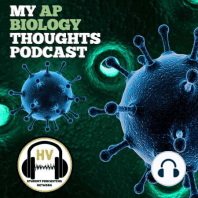23 min listen
The Laws of Thermodynamics
ratings:
Length:
5 minutes
Released:
May 24, 2021
Format:
Podcast episode
Description
My AP Biology Thoughts Unit 3 Cellular EnergeticsWelcome to My AP Biology Thoughts podcast, my name is Sid and I am your host for episode # 66 called Unit 3 Cellular Energetics: The Laws of Thermodynamics. Today we will be discussing the three laws of thermodynamics. Segment 1: Introduction to the Laws of Thermodynamics I’ll start by listing the three laws of thermodynamics, and then I’ll explain each one conceptually. The first law of thermodynamics states that energy is always conserved, and can never be created or destroyed. The second law states that the sum of the entropy of a system and its surroundings must always increase. Lastly, the third law states that a perfect crystalline solid at absolute zero has an entropy of zero. Segment 2: More About the Laws of Thermodynamics Now let’s dig deeper into each law. As I stated, the first law of thermodynamics is about conservation of energy. Rather than being destroyed, energy in the system is converted to other forms of energy. For example in a swinging pendulum, energy is converted from potential energy to kinetic energy as it swings. In each swing, a small amount of energy is transferred to heat due to friction with the air. This eventually causes the pendulum to stop. As you can see, there is no energy destroyed in this system. Energy goes from potential to kinetic until all of the energy gets transferred to heat.The second law of thermodynamics is about entropy in a system. Entropy is most easily described as disorder. So, when we say entropy is always increasing, what this means in the most basic sense is that disorder of the universe or a system is always increasing. An analogy for this is a bedroom. As time goes on, your bedroom will become more and more messy if you don’t clean it. However, your bedroom will not become more and more neat. This is similar to entropy because energy in a system has a tendency to become more disordered or dispersed, just like your bedroom has a tendency to become more disordered.The third law of thermodynamics has to do with absolute zero. Absolute zero is conceptually the coldest possible temperature. Temperature is described as a measure of available heat energy. As the temperature goes down in a system, the kinetic energy of particles drops as well. If the temperature drops enough, then the kinetic energy of particles completely runs out and the particles come to a stop. This is called absolute zero. At this temperature, any substance becomes solid. This means that the entropy of the substance at absolute zero will be zero. Since no particles are moving, there is only one possible state for a substance to be in. Basically, there is no disorder, meaning there is no entropy. However, it should be stated that absolute zero is impossible to reach. Segment 3: Connection to the Course These laws that govern large systems are also what govern metabolic pathways like cellular respiration and photosynthesis. When we talk about the reactions happening in our metabolic pathways, we’ll often state that energy is lost. This relates back to the first law of thermodynamics. When we say that, we don’t really mean that energy is lost. What we really mean is energy is lost as heat. When we...
Released:
May 24, 2021
Format:
Podcast episode
Titles in the series (100)
Invasive Species by My AP Biology Thoughts
